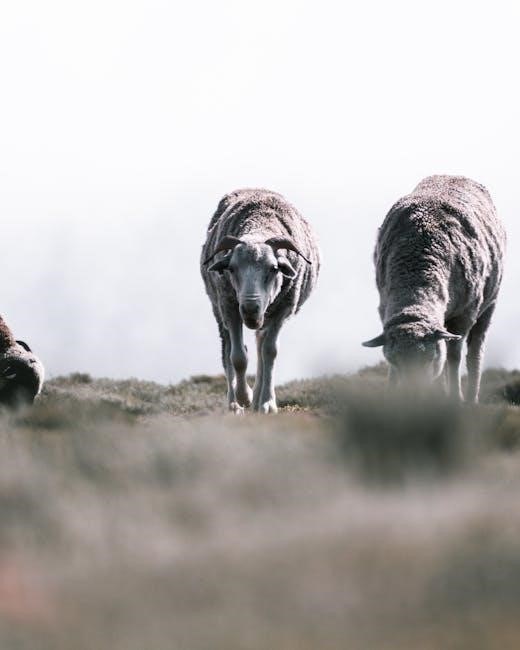Black Sheep, co-authored by Brynne Weaver and Alexa Harlowe, is a gripping dark romance that follows Bria Brooks, a morally complex protagonist seeking revenge against the cult that betrayed her. With its intense enemies-to-lovers dynamic and haunting themes, this book captivates readers with its raw emotion and layered storytelling.
Background and Inspiration Behind the Book
Black Sheep, co-authored by Brynne Weaver and Alexa Harlowe, draws inspiration from themes of resilience, betrayal, and the complexities of human morality. The story is deeply rooted in the authors’ exploration of dark, gritty narratives, often influenced by real-life experiences of isolation and revenge. Brynne Weaver, known for her intense character development, crafted Bria Brooks as a symbol of both vulnerability and ferocity, reflecting her own fascination with morally ambiguous protagonists. The cult upbringing of Bria Brooks was inspired by Weaver’s interest in the psychological dynamics of such environments, blending fiction with eerie realism. The book’s playlist, curated by the author, features tracks that evoke the emotional turmoil and dark undertones of the narrative, further immersing readers in Bria’s world. This collaboration with Alexa Harlowe added a unique layer of depth, blending their shared love for dark romance with a fresh, modern twist.
Overview of the Plot and Main Characters
Black Sheep revolves around Bria Brooks, a fiercely independent protagonist who was cast out of a cult and left for dead. Driven by a thirst for revenge, she targets the cult members responsible for her suffering, marking herself as a serial killer in the eyes of others. Her life intertwines with Eli, a mysterious figure with his own dark past, creating a volatile enemies-to-lovers dynamic that fuels the story. Bria’s character is a blend of vulnerability and ruthlessness, making her both relatable and formidable. Eli, on the other hand, is shrouded in secrecy, his true motives slowly unveiled as the plot progresses. Together, they navigate a world of danger, betrayal, and forbidden attraction, with Bria’s relentless pursuit of vengeance clashing with her growing feelings for Eli. This intricate dance between revenge and redemption forms the core of the narrative, supported by a cast of morally grey characters who challenge the lines between good and evil.
Author’s Intent and Writing Style
Brynne Weaver’s Black Sheep showcases a bold and unflinching writing style, blending gritty realism with dark, atmospheric prose. Weaver’s intent is to explore the complexities of human nature, particularly through morally ambiguous characters like Bria Brooks, who embodies both vulnerability and ruthlessness. The narrative delves into themes of revenge, redemption, and forbidden love, creating a tense, emotionally charged environment. Weaver’s prose is raw and evocative, drawing readers into Bria’s inner turmoil and her relentless pursuit of justice. The enemies-to-lovers dynamic between Bria and Eli is crafted with intensity, balancing moments of tenderness with sharp, biting dialogue. Weaver’s ability to weave together suspense, romance, and psychological depth highlights her skill in the dark romance genre. The book’s immersive atmosphere is further enhanced by Weaver’s curated playlist, which reflects the mood and tone of the story, offering readers a deeper connection to the narrative;

Key Themes and Elements of Black Sheep
Black Sheep explores morally grey characters, betrayal, and revenge, set against a dark, atmospheric backdrop. The story delves into intense relationships, forbidden love, and personal redemption, creating a gripping narrative that captivates readers emotionally.
Exploration of Morally Grey Characters
Black Sheep masterfully explores characters who exist in the moral grey area, where right and wrong blur. Bria Brooks, the protagonist, is portrayed as a wolf rather than a mere outcast, driven by a dark past and a thirst for revenge. Her actions, though justified to her, walk the line between justice and vengeance, making her a deeply complex and relatable character. The narrative delves into her history with a cult that cast her out and attempted to kill her, shaping her into the person she is today. This backstory adds layers to her character, making her more than just an avenger but a multidimensional being with understandable motives. The enemies-to-lovers trope further complicates her relationships, introducing tension and emotional depth. Through Bria’s journey, the book challenges readers to question their own moral compass and empathize with characters who are far from perfect. This exploration of morally grey characters is a significant strength of the novel, keeping readers engaged and invested in their fates.
The Theme of Revenge and Redemption
Black Sheep delves deeply into the themes of revenge and redemption, creating a narrative that is both haunting and thought-provoking. Bria Brooks, the protagonist, is driven by a relentless desire for vengeance against the cult that expelled and attempted to kill her. Her journey is marked by calculated actions aimed at dismantling the cult, showcasing her transformation from a victim to a formidable force. The novel explores the emotional and psychological toll of revenge, highlighting the fine line between justice and obsession. Through Bria’s struggles, readers witness the internal conflict of seeking redemption while being consumed by hatred. The story raises questions about the cyclical nature of vengeance and whether true redemption is achievable. This theme is central to the novel, adding depth and complexity to the plot, and resonating with readers who grapple with similar existential questions. The interplay between revenge and redemption makes Black Sheep a compelling and emotionally charged read.
Enemies-to-Lovers Trope in the Storyline
The enemies-to-lovers dynamic in Black Sheep is a central element of the story, adding intense tension and emotional depth to the narrative. Bria and Eli, the main characters, are initially adversaries, their relationship defined by animosity and a dangerous game of power and control. As the story progresses, their mutual attraction becomes undeniable, despite their conflicting goals and the volatility of their interactions. The trope is executed masterfully, with a slow-burn tension that keeps readers captivated. The transition from enemies to lovers is fraught with challenges, making their eventual connection all the more compelling. This dynamic is a hallmark of dark romance and is woven seamlessly into the plot, enhancing the overall impact of the story. Through this trope, Brynne Weaver explores themes of loyalty, trust, and the blurred lines between love and hatred, creating a narrative that is both gripping and emotionally resonant. The enemies-to-lovers element is a key factor in the book’s appeal, particularly for fans of the genre.

Reception and Impact of Black Sheep
Black Sheep has garnered significant attention for its gripping storyline and complex characters, resonating deeply with fans of dark romance. Readers praise its raw emotion, moral ambiguity, and the enemies-to-lovers trope, solidifying its place in the genre.
Reader Reviews and Feedback
Black Sheep has captivated readers with its intense storytelling and morally complex characters, drawing praise for its raw emotion and gripping narrative. Fans of dark romance have embraced the book, noting its ability to evoke strong emotions and create a deep connection with the characters. Many readers have highlighted Bria’s journey as a standout element, praising her resilience and the depth of her character development. The enemies-to-lovers trope has also been a major draw, with readers appreciating the tension and chemistry between the protagonists. Some have described the book as “unputdownable,” while others have noted its thought-provoking themes and emotional depth. Overall, Black Sheep has left a lasting impression on its audience, solidifying its place as a favorite among fans of the genre. Its ability to balance darkness with moments of vulnerability has resonated deeply, making it a memorable read.
Comparison with Other Dark Romance Novels

Black Sheep stands out in the dark romance genre with its unique blend of revenge, redemption, and morally complex characters. Fans of S.T. Abby’s Mindfck series and Sophie Lark’s Sinners Duet have drawn parallels due to its gritty storytelling and intense character dynamics. Unlike other novels in the genre, Black Sheep delves deeper into the psychological aspects of its protagonists, creating a more immersive experience. The enemies-to-lovers trope is executed masterfully, adding layers of tension and emotional depth. While some dark romances focus solely on the romance, Black Sheep balances this with a compelling revenge plot that keeps readers engaged. Its ability to weave together suspense, raw emotion, and complex relationships sets it apart from other books in the genre. Readers have praised its originality and the way it challenges traditional dark romance narratives, making it a standout read for fans seeking something fresh and captivating.

Cultural Impact and Fandom Engagement
Black Sheep has left a significant mark on the literary community, particularly among fans of dark romance. Readers have actively engaged with the book through discussions on platforms like Reddit and Goodreads, where it has gained a dedicated following. The novel’s playlist, curated by Brynne Weaver, featuring 22 songs, has also resonated with fans, enhancing their reading experience. Many enthusiasts have shared their interpretations of the characters and themes online, creating a vibrant fandom. The book’s exploration of morally gray characters and its intense revenge narrative have sparked debates about the boundaries of romance and the appeal of antiheroes. Fan art and fan fiction inspired by Bria and Eli’s story have emerged, showcasing the book’s cultural influence. This level of engagement highlights how Black Sheep has not only entertained but also inspired creativity and meaningful conversations among its readers, solidifying its place in contemporary dark romance culture.